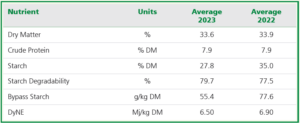Maize is a key part of many dairy diets, choosing the right seed is paramount to ensuring the end plant meets the dietary requirements.
The maize harvest from 2023 didn’t see the best outcomes despite yielding well. The crop maturity, cob development and starch deposition were poor, likely due to the unusually high rainfall and lack of sun in August. Given this it is important to have maize silages analysed as well as grass silage to ensure diets are suitably balanced.

Starch isn’t as rumen digestible in the silages fed earlier in the season compared to those fed later in the season. This means more starch will pass through the cow coming straight back out in the manure, this is crucial to productivity from the diet as every 1% increase in faecal starch over 3% gives the potential to lose 0.5kg milk. Therefore, an increased level of faecal starch will lead to poor utilisation and have the potential to decrease cow performance.It is important to choose a maize variety that will have good levels of starch that are well digested, in addition to plating and maturity. When looking to choose a seed variety there are two distinct maize groupings; Flint and Dent.
The maize seed grown in the UK is almost exclusively Flint because of its:
- Early vigour
- Slightly better cold tolerance
In contrast Dent varieties characteristics have:
- Higher yield potential
- Higher rumen starch digestibility
- Softer Kernels
- Better drought tolerance
There is currently only one variety of dent grain hybrid maize available in the UK; P7034 from Pioneer. It is a very early maturity plant bred specially to be grown in cooler climates with a plant that flowers early and produces silage with a very high starch content, which degrades in the rumen at a much faster rate than the typical flint varieties. As a result of this P7034 can be fed quickly out of the clamp, therefore it is worth growing even as 25% of the seed drilled with the P7034 variety should be clamped last and fed first. This will help with the transition from old harvest to new allowing the flint varieties to be left ensiled for longer allowing ruminal starch digestibility to increase. The P7034’s endosperm is soft and floury, this means that it is more readily broken down in the rumen than the hard, vitreous endosperm found in flint grain hybrids.
Once the correct seed has been chosen the next challenge is to get it drilled at the optimum time, it is important to check soil temperatures before drilling. Using a soil thermometer placed 5-10 cm into the ground, check at about 9am each day. When the soil temperature is consistently above 8º C it is suitable for drilling. As we move towards spring now is the time to start to consider what seed you want this year.
For further information on NWF maize seed please click HERE.
By NWF Kim Stuart, Regional Sales Executive

